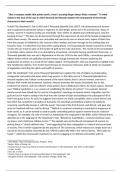Essay
A* A Level English Literature NEA- Eduqas WJEC
- Course
- Institution
Top mark a level English literature NEA Essay. Just over 3000 words. Title of the essay: '"Like a compass needle that points north, a man's accusing finger always finds a woman." To what extent is this true of the way in which Atwood and Hosseini explore the entrapment of female characters in their...
[Show more]



